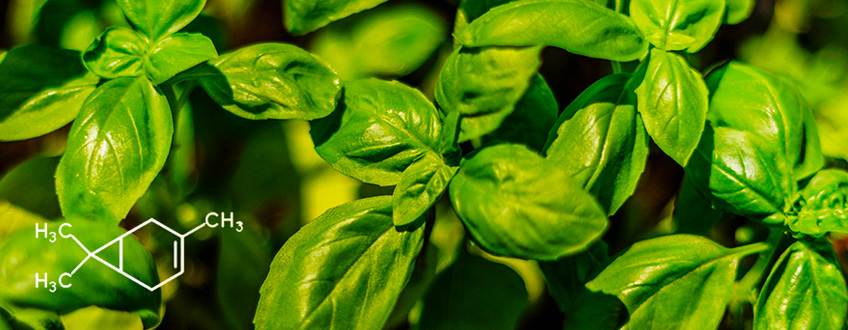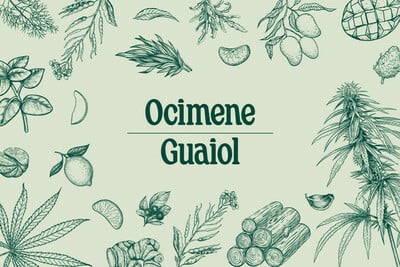.

Carene: A Unique Terpene With Anti-Inflammatory & Bone-Healing Properties
Carene is a bicyclic monoterpene with a scent resembling lemon, musk, and pine. Like other terpenes, it's an insect repellent, but it also shows interesting anti-inflammatory, antifungal, and bone-healing properties. Read on to learn more about this unique cannabis component.
δ-3-carene, hereinafter referred to as carene, has a sweet, hearty, and pungent smell resembling lemon, musk, and pine. It can be found in basil, pepper, cedar, pine, rosemary, and turpentine. This bicyclic monoterpene can be effectively extracted from several plants, and it’s a component of many essential oils used in aromatherapy. It’s also used as a food flavoring, in cosmetics, insect repellents, and other products.
This terpene has some valuable properties still under investigation. Among its potential benefits for the body and brain are anti-inflammatory and antifungal effects, and a positive action on the central nervous system. However, the most interesting therapeutic characteristic of carene is probably its capability of helping bone healing.
Like other terpenes, carene is non-toxic, but it may cause irritation when inhaled. The cannabis flower often develops carene among its protective chemical compounds, even if this is not one of the most abundant terpenes. Despite carene's potential therapeutic properties, its ability to remove fluids from the body, saliva included, make it a controversial terpene among recreational users.
CARENE CAN RELIEVE INFLAMMATION AND PAIN
Carene has some potent anti-inflammatory properties. Back in 1989, research showed a strong activity against acute inflammation[1] exerted by two essential oils containing carene and other terpenes. Today, a new study on traditional Chinese medicine confirmed the efficacy of an essential oil of the Gynura procumbens plant, which is traditionally used for the treatment of traumatic injuries. This oil contains pinene, carene, and limonene. It was tested on rats to assess its anti-inflammatory and antinociceptive effects—with remarkable results. Each one of the three ingredients was able to inhibit the induced inflammation, while carene also acted as a painkiller[2]. Given its capacity of reducing inflammation and minimising joint pain, the next challenge will be to investigate if and how this terpene may be included in treatments for traumas or conditions like arthritis.
CARENE HELPS THE BONE-HEALING AND GROWTH PROCESS
Research is showing that together with its anti-inflammatory action, carene can speed up bone healing, repair, and growth, especially in cases of malnutrition or injury. A lab study compared the effects of many different natural compounds on bone formation, finding that carene strongly stimulates the growth and mineralisation[3] of bone cells. While the biochemical mechanisms are yet to be understood, the activity of carene in bone metabolism might soon be harnessed in dietary supplements, and even in novel drugs.
The medical significance of these results adds up to the already lab-proven bone-healing activity of cannabinoids, once again confirming the potentiality of the entourage effect in cannabis medicine. Together with CBD, THC, and other cannabis plant compounds, carene may become part of a prevention and treatment strategy for osteoporosis and other conditions such as arthritis, bursitis, fibromyalgia, and others.

CARENE IS ANTIFUNGAL
Juniper essential oil is mainly composed of pinene and carene. A study tested its power to combat fungal infections[4] in clinical settings against strains of Candida, Aspergillus, and dermatophytes fungi causing infections of the skin, hair, and nails. The antifungal activity of juniper oil was evident, and carene was shown to be a fundamental compound in this action. The results highlight juniper oil and other essential oils with similar components as therapeutic alternatives for dermatophytosis and other kinds of mycotic infections. Fungal resistance to antimycotic compounds and the small number of these remedies keeps leading to the search for therapeutic alternatives among plants, and these results are encouraging for more clinical research on terpenes.
CARENE IN THE CANNABIS PLANT
We have indications that carene acts on the central nervous system when administered in high concentrations, possibly stimulating memory and increasing memory retention. This might be good news for everyone, not just for Alzheimer’s patients who may use cannabis in the near future to help alleviate their condition. However, carene’s ability to remove excess fluids from the body, like tears, mucus, sweat, and even menstrual blood, might not be appreciated by everyone since it’s likely one of the causes for dry mouth, itchy throat, and eye redness associated with smoking cannabis. There are other factors involved in these effects, yet strains with high levels of carene might end up more appreciated by the medicinal user than the recreational one. Still, this terpene can boost the anti-inflammatory properties of cannabinoids, and a balanced terpene profile in the cannabis flower including carene might be both a pleasure by itself and be used by patients who suffer from various causes of inflammation.
Terpene levels vary according to environmental factors, but every single cannabis strain produces higher levels of some terpenes than others. When looking for this volatile monoterpene, you should select strains that are supposed to have a sweet, “piney”, and earthy aroma.
Two strains with high carene content are Lemon Shining Silver Haze and Skunk XL. The first is obviously a “lemon” strain, adding the antidepressant action of limonene. Its THC production is also very high. Skunk XL is a classic indica/sativa strain with a balanced terpene profile in a big, fast-flowering plant. Whichever strain you pick, be sure to start your vaporizing session at a temperature lower than the boiling points of the most aromatic and volatile terpenes.
- Europe PMC http://europepmc.org
- Anti-inflammatory and Antinociceptive Effects of Active Ingredients in the Essential Oils From Gynura Procumbens, a Traditional Medicine and a New and Popular Food Material - PubMed https://www.ncbi.nlm.nih.gov
- Low concentration of 3‐carene stimulates the differentiation of mouse osteoblastic MC3T3‐E1 subclone 4 cells https://onlinelibrary.wiley.com
- Antifungal activity of Juniperus essential oils against dermatophyte, Aspergillus and Candida strains http://agris.fao.org










































